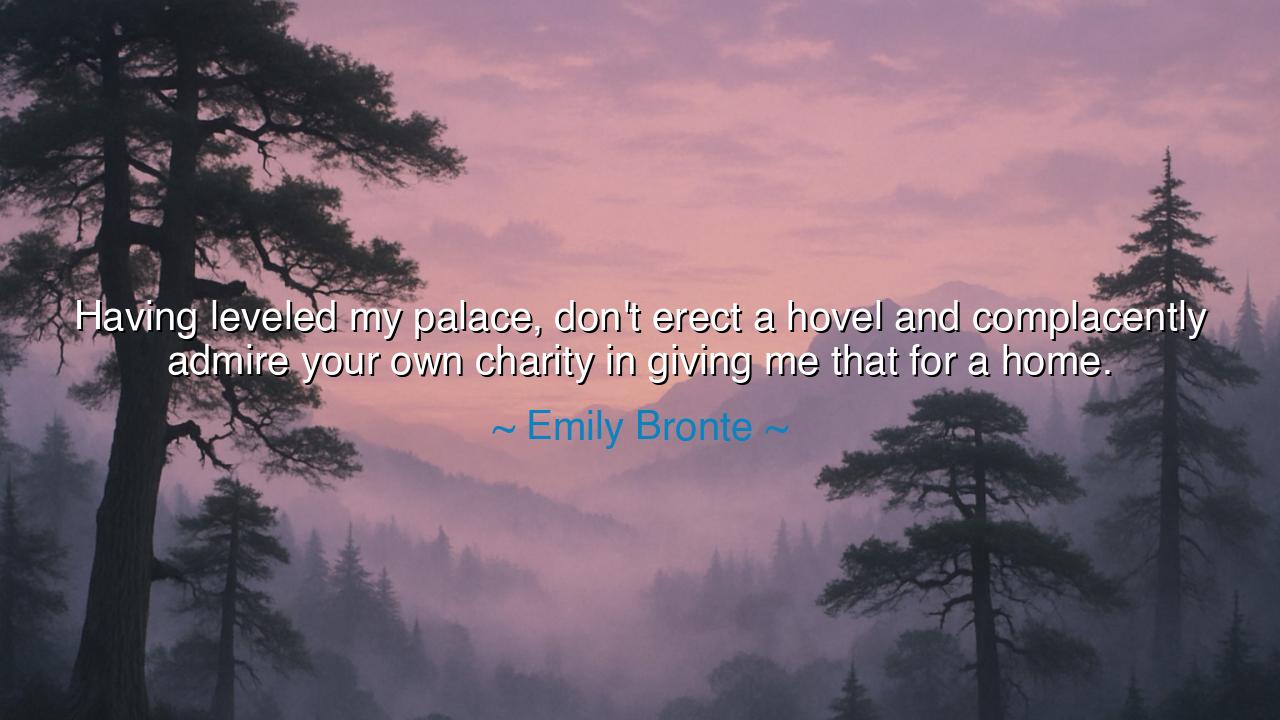
Having leveled my palace, don't erect a hovel and complacently
Having leveled my palace, don't erect a hovel and complacently admire your own charity in giving me that for a home.






“Having leveled my palace, don't erect a hovel and complacently admire your own charity in giving me that for a home.” So spoke Emily Brontë, with the voice of one who had tasted the cold charity of false benefactors and the bitterness of pride disguised as mercy. These words rise like a storm out of the soul’s ruins, a protest against condescension masquerading as kindness. She who wrote Wuthering Heights knew too well that destruction cannot be disguised as generosity. In her cry, we hear not only the wound of the heart but the eternal demand for dignity—that no gift, however gilded, can redeem the hand that first tore down what it pretends to rebuild.
In this saying, Brontë denounces the hypocrisy of those who ruin another and then offer paltry comfort, expecting gratitude in return. The palace is not of marble or gold, but of spirit, love, and honor—the noble dwelling of one’s inner worth. When such a palace is destroyed, whether by betrayal, cruelty, or arrogance, what insult is greater than to offer a hovel—a poor imitation, a token of pity—and to stand proudly as though one had been merciful? Her words burn with righteous indignation: to claim virtue after inflicting harm is the most refined cruelty of all.
Consider, for example, the tale of King Lear, who cast away his faithful daughter, Cordelia, and later crawled upon the earth begging for her forgiveness. The false daughters, Goneril and Regan, stripped him of power and pride, and when at last they offered shelter, it was not out of love but vanity—so that they might admire themselves as saviors of the man they had ruined. Lear’s madness grew not from the storm outside but from the realization that even pity can be poisoned. In this, Brontë’s warning resounds: when we destroy another’s world, we must not dare to think our crumbs of kindness can rebuild what we have burned.
Throughout history, men and empires alike have fallen prey to this illusion. The conqueror razes cities and then builds schools in their ashes, calling himself a civilizer. The master frees his slave and expects worship for his benevolence, though he first bound the chains. The wealthy patron praises his own charity to the poor, yet forgets that his wealth was made from their toil. Such acts, though wrapped in the cloak of generosity, are but monuments to vanity. True goodness does not admire itself, nor demand thanks from those it has wronged.
Brontë’s words thus teach the difference between atonement and self-congratulation. Atonement humbles the heart; it seeks to restore what was lost without demanding admiration. But self-congratulation erects the hovel—a poor, fragile structure—where a palace once stood. The soul that acts from pride builds nothing that endures. To repair the harm we have caused, we must first kneel amid the ruins, not to be praised, but to understand. Only then may we begin to rebuild, not as masters, but as servants of truth.
And yet, this quote also speaks to the wounded. To those whose palaces have been leveled, it whispers: do not accept the hovel. Do not mistake pity for love, or crumbs for justice. Stand firm in your own worth, and remember that your palace—though shattered—was built by the strength of your spirit. Better to dwell amid ruins with dignity than to live in comfort born of humiliation. The heart that knows its own value cannot be bribed by false mercy.
So let this teaching be carried forward: do not destroy what you cannot restore, and if you must rebuild, do so in silence, with humility. Offer not pity, but respect; not charity, but restoration. And to those who have been wronged, guard your heart from accepting less than it deserves. For the palace of the soul is sacred, and once desecrated, only truth can make it whole again.
Thus, Emily Brontë’s words remain a torch of wisdom through the centuries—a reminder that love and justice demand sincerity, not show. To the generations who follow, remember this: when you have power over another, use it to lift, not to lord; to heal, not to humiliate. For the measure of our humanity is not in what we give, but in how we give it, and whether our hands are clean of the harm we pretend to mend.






AAdministratorAdministrator
Welcome, honored guests. Please leave a comment, we will respond soon